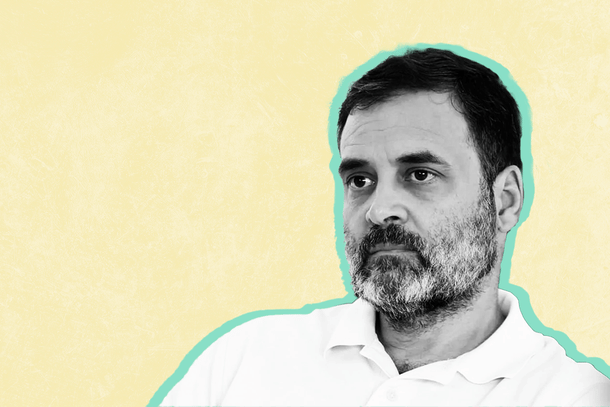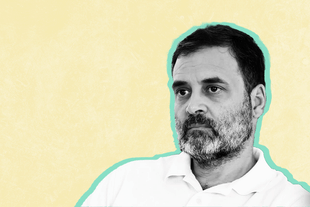Politics
For Young India, A Grim Reminder Of What Emergency Really Meant
Surabhi Hodigere
Jun 25, 2024, 01:12 PM | Updated 01:19 PM IST
Save & read from anywhere!
Bookmark stories for easy access on any device or the Swarajya app.


Many of us were not born when the Emergency was declared in India, but its impact on our democratic fabric is something we must never forget.
Recently, Rahul Gandhi has been seen championing the Constitution, but let's take a closer look at the history of his party and the significant harm it caused to our democracy during the Emergency.
The Midnight Coup
On the night of 25 June 1975, prime minister Indira Gandhi, without consulting her cabinet, advised president Fakhruddin Ali Ahmed to declare a state of Emergency, citing "internal disturbances".
This drastic move came after the Allahabad High Court found her guilty of electoral malpractice and disqualified her from holding office. Instead of stepping down, she chose to impose an Emergency, thereby suspending the democratic process.
During the Emergency, just one day before the Supreme Court's hearing on 10 August 1975, Parliament passed the Constitution (39th Amendment) Act, 1975. This amendment introduced a new Article, 329A, which retroactively validated Indira Gandhi's election that had been invalidated by the Allahabad High Court, despite her appeal still pending before the Supreme Court.
Parliament thus overstepped its role, acting as an appellate body over the Supreme Court. By performing a judicial function, the legislature disregarded the rule of law and democracy, effectively burying the doctrine of separation of powers.
Fundamental Rights Stripped Away
The government also suspended fundamental rights, including freedoms of speech and expression, and the right to legal recourse. This meant that people could be arrested and detained without trial, and any form of dissent was ruthlessly crushed.
Over 100,000 political opponents, activists, and ordinary citizens were detained under draconian laws like the Maintenance of Internal Security Act (MISA). Indira Gandhi’s actions demonstrated how state machinery could be misused for personal political survival.
Media Gagged
The media was heavily censored. Newspapers were required to get prior approval for any content related to the government, effectively stifling the free press. Some newspapers resorted to leaving editorial spaces blank as a form of silent protest.
This period saw a complete shutdown of critical journalism, with severe repercussions for the democratic process. The erosion of public trust in democratic institutions such as the judiciary, the press, and the electoral system was profound, and restoring this trust has been a long and challenging process.
Changes To The Constitution
Indira Gandhi’s regime manipulated the Constitution to an unprecedented extent. The 38th and 42nd Amendment Act drastically altered the Constitution.
The 38th Amendment to the Constitution, passed on 1 August 1975, was the first of many that followed the declaration of Emergency. This amendment stripped the Judiciary of its right to conduct a judicial review of the Emergency itself.
Further, the following important changes were made through the 42nd amendment to the Constitution:
1. Amendment to Article 368: This allowed Parliament to amend any part of the Constitution without judicial review, undermining the Supreme Court's authority. By declaring that there would be no limitation on the power of Parliament to amend the Constitution, it effectively nullified the Supreme Court’s ruling in Kesavananda Bharati versus State of Kerala (1973), which had established the Basic Structure Doctrine.
2. New Directive Principles: The amendment gave primacy to Directive Principles over Fundamental Rights, meaning that any law enacted to implement Directive Principles could not be challenged in court for violating Fundamental Rights.
New Directive Principles were added:
- Article 39A: Promoted equal justice and free legal aid.
- Article 43A: Encouraged the participation of workers in management.
- Article 48A: Focused on the protection and improvement of the environment.
3. Article 74 Amendment: It was explicitly stipulated that the President shall act in accordance with the advice of the Council of Ministers, effectively reducing the President’s discretionary powers.
4. Extension of Parliamentary Terms: The amendment extended the term of Lok Sabha and state legislative assembly members from five to six years by amending Article 172 and Clause (2) of Article 83.
5. Suspension of Fundamental Rights: Amendments to Articles 358 and 359 allowed for the suspension of Fundamental Rights during the Emergency. Article 359 specifically suspended the right to move any court for the enforcement of rights under Articles 14 (Equality before Law), 19 (Protection of certain rights regarding freedom of speech), and 21 (Protection of life and personal liberty).
6. Changes to Judicial Powers:
- Article 228A: This new article empowered High Courts to determine the constitutional validity of any state law, diluting the Supreme Court's overarching authority.
- Office of Profit: The amendment revoked the courts' power to determine what constituted an office of profit, affecting the eligibility criteria for legislative members.
7. Anti-National Declaration:
The 42nd Amendment provided that laws prohibiting "anti-national activities" or the formation of "anti-national associations" could not be invalidated even if they infringed on any of the Fundamental Rights. This gave the government sweeping powers to suppress dissent and opposition under the guise of protecting national integrity.
Reversal Of Democratic Norms
Following the end of the Emergency, the Janata Party government enacted the 43rd and 44th Amendments to reverse many of the changes brought by the 42nd Amendment, restoring democratic norms and judicial oversight.
While Rahul Gandhi and other leaders of the Congress party today speak of protecting the Constitution, it's essential to remember the party's past actions, legacy, and unapologetic stances.
On the issue of Emergency, Rahul Gandhi had once remarked, "I think that was a mistake. Absolutely, that was a mistake. And my grandmother (Mrs. Gandhi) said as much. (But) the Congress at no point attempted to capture India's institutional framework... frankly, it does not even have that capability."
This is not an apology but instead, it is an excuse. It fails to acknowledge the depth of the damage inflicted upon India's democracy and falls short of a genuine atonement for such a significant breach of democratic principles.
However, events of the Emergency show that institutions were not just captured but were completely disbanded and demolished to pander to Indira Gandhi's whims. The Emergency serves as a stark reminder of the profound damage inflicted when institutions are undermined.
This is the legacy Rahul Gandhi has inherited — a legacy where the government of India, the Constitution, and democracy were under the thumb of his grandmother.
Furthermore, the venomous attack on changing the Constitution is hypocritical, considering the Congress party and Rahul Gandhi's family are the only ones who have ever threatened Baba Saheb's Constitution by making changes to the Preamble. The Congress party has a history of undermining democratic values, and Rahul Gandhi’s statements do nothing to mitigate that legacy.
Rahul Gandhi and the Congress party have no moral right to speak on the Constitution without completely disowning Indira Gandhi for the imposition of the Emergency.
Surabhi Hodigere is the CEO Political Quotient Consultants Pvt. Ltd. She is passionate about politics, entrepreneurship, economics and all things spiritual.





